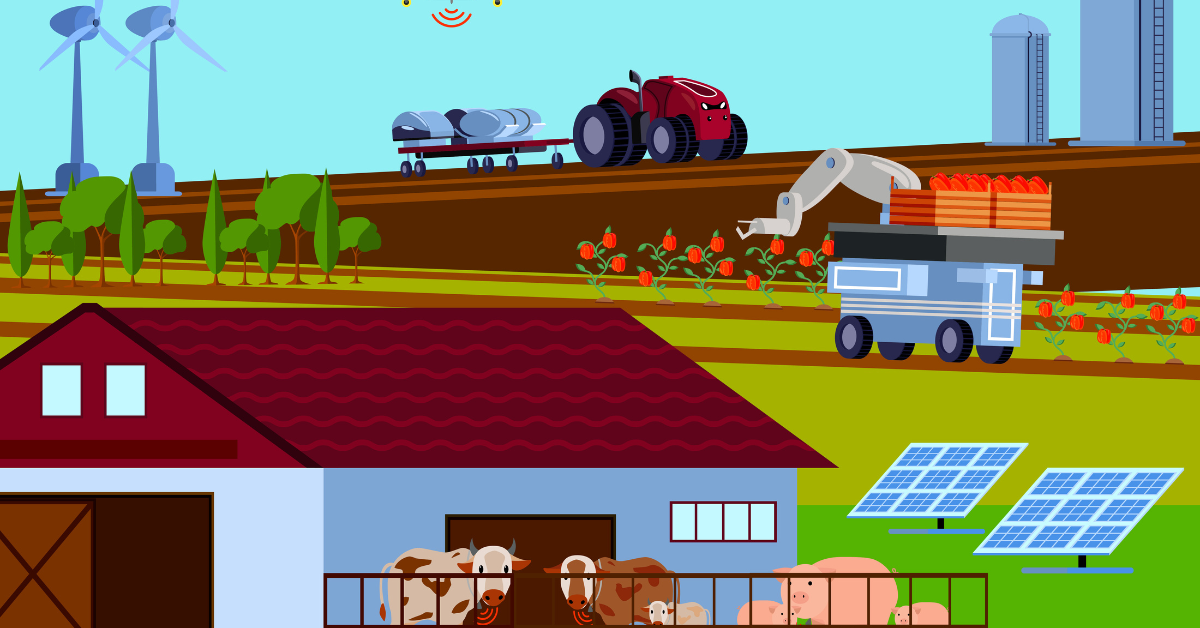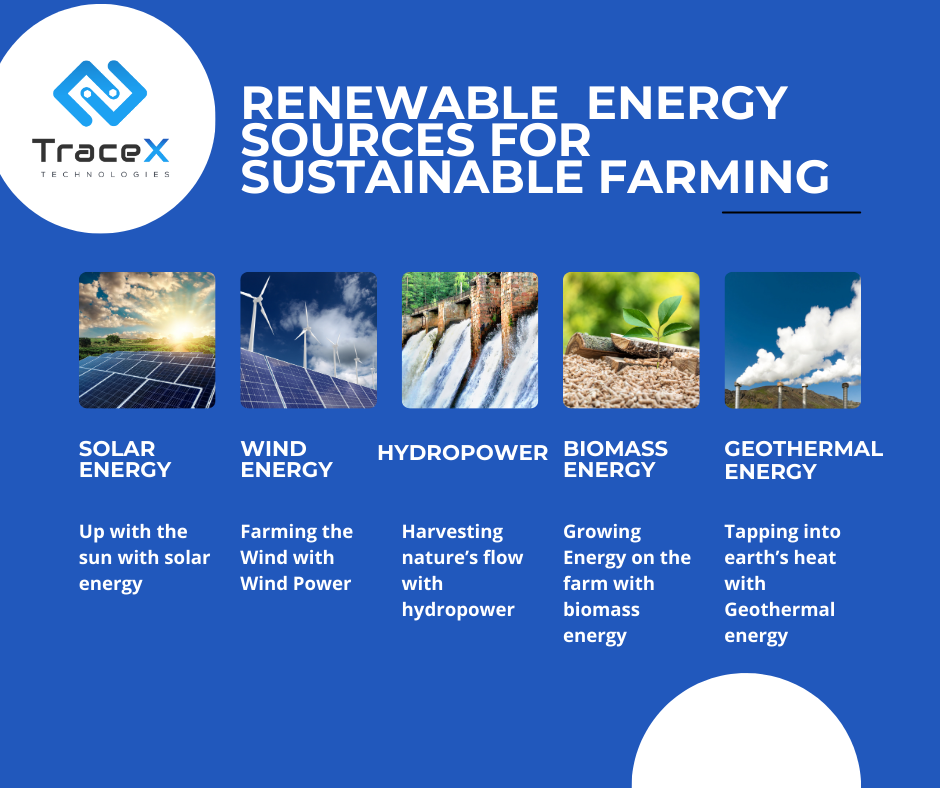Contact: +91 99725 24322 |
Menu
Menu
Quick summary: Explore how renewable energy solutions can drive sustainability in business by reducing costs, lowering carbon footprints, and minimizing reliance on finite resources. Learn how adopting these innovations can enhance efficiency, resilience, and contribute to global environmental and food security goals.

Businesses today are facing increasing pressure to minimize their environmental impact, and one of the biggest challenges is finding energy sources that are both reliable and sustainable. Traditional energy sources are not only depleting but are also contributing to rising operational costs and significant carbon emissions. But there’s hope. Renewable energy solutions offer a powerful way to break free from these constraints, providing a sustainable path forward that can reduce costs, enhance energy security, and significantly lower a company’s carbon footprint. The question isn’t whether your business can afford to go green—it’s whether it can afford not to.
Today’s consumers and stakeholders are increasingly concerned about environmental impact and expect businesses to take meaningful actions. Companies that prioritize sustainability through renewable energy not only demonstrate their commitment to the planet but also build trust and loyalty among customers, investors, and employees. It’s more than just meeting a goal; it’s about leading the way toward a more sustainable future.
Key Takeaways
The Importance of Renewable Energy in Business
Environmental Impact
Switching to renewable energy isn’t just a smart business move; it’s a critical step toward reducing carbon emissions, actively combating climate change and accelerating net zero goals. Traditional energy sources like coal, oil, and natural gas are significant contributors to greenhouse gas emissions, which are driving global warming and environmental degradation. By embracing renewable energy sources like solar, wind, and bioenergy, businesses can drastically cut their carbon footprint, leading to cleaner air, healthier communities, and a more stable climate.
Economic Benefits
The financial advantages of renewable energy for businesses are compelling. One of the most significant benefits is the potential for long-term cost savings. While the initial investment in renewable energy systems like solar panels or wind turbines can be substantial, these costs are often offset by the savings on energy bills over time. Unlike fossil fuels, which are subject to market fluctuations and can be expensive, renewable energy sources are often free after the installation of the necessary infrastructure. This means businesses can lock in lower energy costs, improving their bottom line and financial stability.
Regulatory Compliance
The regulatory landscape around energy and emissions is becoming increasingly stringent. Governments around the world are implementing tougher regulations to reduce carbon emissions and promote the use of renewable energy. Businesses that continue to rely heavily on fossil fuels risk non-compliance, which can result in hefty fines, legal challenges, and reputational damage. On the other hand, those that proactively adopt renewable energy are not only compliant but are often eligible for various incentives, tax breaks, and grants designed to encourage sustainable practices.
Renewable Energy in Agriculture
Modern farming demands significant energy inputs. This includes power for machinery, irrigation, heating, and cooling in controlled environments. Energy-intensive practices can strain resources and contribute to greenhouse gas emissions Thus, sustainable agriculture seeks to reduce energy consumption and incorporate renewable sources to mitigate environmental impact.
Traditional energy sources, such as fossil fuels (coal, oil, natural gas), are unsustainable due to their finite supply, environmental damage, and contribution to climate change. Their extraction and combustion release greenhouse gases, deplete resources, and harm ecosystems. Transitioning to renewable energy is essential to mitigate these issues and ensure long-term sustainability.
Renewable energy plays a pivotal role in mitigating environmental impact by significantly reducing greenhouse gas emissions and air pollutants. Sources like solar, wind, and hydropower generate power without the harmful byproducts associated with fossil fuels. This transition to clean energy is vital for combating climate change and preserving the planet’s ecosystems.

Renewable energy sources offer farms diverse and sustainable ways to meet their energy needs. Here’s a look at some of the key options:
Solar panels convert sunlight into electricity, providing a reliable source of energy for farms. Solar systems can be installed on rooftops, open fields, or integrated into agricultural structures. They reduce electricity bills and offer long-term cost savings.
Advantages:
Limitations:
Wind turbines harness the power of the wind to generate electricity. Farms with sufficient wind resources can install wind turbines, often in collaboration with local energy grids. Wind energy is intermittent, but it can be a valuable source of renewable power, especially in rural areas.
Advantages:
Limitations:
Biomass, such as crop residues or dedicated energy crops, can be converted into bioenergy through processes like anaerobic digestion or combustion. This provides on-site energy generation and reduces waste while promoting resource efficiency.
Advantages:
Limitations:
Farms near rivers or streams can utilize small-scale hydropower systems. Water flows turn turbines to produce electricity. While permitting and infrastructure can be challenging, it offers a consistent source of energy.
Advantages:
Limitations:
Geothermal heat pumps can provide heating and cooling for farm buildings. This technology relies on the stable temperature of the Earth below the surface, reducing the energy required for climate control.
Advantages:
Limitations:
Implementing renewable energy on farms offers several compelling benefits.
Implementing renewable energy sources on farms yields a multitude of positive impacts.
Firstly, it leads to substantial cost savings by reducing or eliminating electricity bills, which can significantly improve a farm’s financial viability. Simultaneously, it lessens the farm’s carbon footprint, contributing to environmental conservation and climate change mitigation.
Renewable energy and the circular economy are two powerful tools in the fight against climate change. Renewable energy sources like solar, wind, and hydro power offer a clean and sustainable alternative to fossil fuels, reducing greenhouse gas emissions and promoting energy independence.
The circular economy, on the other hand, focuses on minimizing waste and maximizing resource efficiency. By designing products for reuse, recycling, and remanufacturing, the circular economy reduces the demand for raw materials and energy, further contributing to supply chain sustainability.
Together, renewable energy and the circular economy can create a more sustainable and resilient future. By transitioning to renewable energy sources and adopting circular practices, we can reduce our environmental footprint, create new economic opportunities, and build a more equitable and sustainable world
Renewable energy is intricately connected to sustainable transportation, by offering a cleaner, more efficient alternative to fossil fuels. Transitioning to renewable energy sources, such as solar or wind, for powering transportation systems significantly reduces greenhouse gas emissions and pollution, aligning with the goals of a nature-positive economy by supporting ecosystem regeneration and reducing environmental impact. By integrating renewable energy into transportation and supply chain strategies, businesses can drive significant progress toward a sustainable future that balances economic growth with environmental stewardship.
Farmers considering renewable energy adoption must navigate several challenges.
Overcoming these challenges requires careful financial planning and navigating regulatory processes.
TraceX Sustainability Platform plays a pivotal role in the meticulous tracking of sustainable farming practices, especially those integrated with renewable energy sources. By harnessing the power of blockchain traceability, TraceX ensures transparent and accurate documentation of eco-friendly initiatives in agriculture. From monitoring the utilization of renewable energy systems to tracking sustainable farming techniques, our platform provides a comprehensive overview.
Explore our Sustainability Platform
In conclusion, the transition to renewable energy and the adoption of emerging technologies are pivotal steps in promoting the sustainability of farming. These advancements reduce costs, carbon footprints, and dependency on finite resources. As the agricultural sector evolves, harnessing innovative solutions will not only improve the efficiency and resilience of farming but also play a vital role in addressing the global challenges of food security and environmental conservation. By embracing these technologies, farmers can cultivate a brighter, greener future for agriculture.
